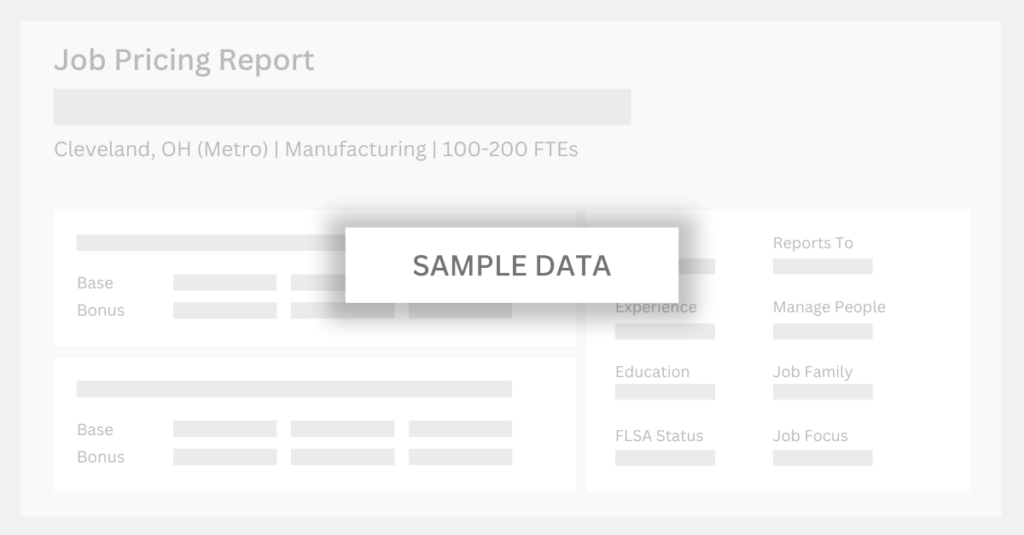Compensation Data for a Biomedical Engineer in Ohio

Compensation data breakouts:
- Location (example: Cleveland, Akron, Ohio, National)
- Company Size (number of full-time employees)
- Industry (industry-specific or all industries)
- Years of Experience
- Education
Data included in each report:
- Base Compensation (Salary or Wage)
- Total Compensation
- Bonus
- Long-term Incentives
- Job Description
- Competencies/Skills
Get a Free Sample Report
Submit the form below to receive a sample job pricing report or to access ERC’s compensation data.

ERC is a leading provider of compensation data
Whether you’re actively recruiting and hiring or trying to stay competitive, having local salary and wage data is critical. ERC members gain access to compensation reports, job description research, and an HR Help Desk for compensation and workplace practices data.
Job Description
Overview
- Develops devices and procedures that solve medical and health related problems, combining biology, medicine, and engineering.
- Plans and researches biological aspects of humans or other animals to develop new theories and facts, or to test, prove, or modify known theories of life systems, and to design life-support apparatus, utilizing principles of engineering and bio-behavioral sciences.
- Excludes paraprofessional positions.
Typical Functions
- Designs life-support apparatus, utilizing principles of engineering and bio-behavioral sciences.
- Plans and conducts research concerning behavioral, biological, psychological, or other life systems.
- Studies engineering aspects of bio-behavioral systems of humans, utilizing knowledge of electrical, mechanical, chemical, or other engineering principles and knowledge of human anatomy and physiology.
- Devises mathematical models to simulate human bio-behavioral systems in order to obtain data for measuring or controlling life processes, utilizing knowledge of computer, graphics, and other related technologies.
- Designs and develops instruments and devices, such as artificial organs, cardiac pacemakers, or ultrasonic imaging devices, capable of assisting medical or other health-care personnel in observing, repairing, or treating physical ailments or deformities, using knowledge of materials compatible with body tissues, energy exchanges within the body, and instrumentation capable of measuring and controlling body functions.
- May specialize in design and development of biomedical equipment used by medical facilities.
Similar Positions
There are several positions that share similar responsibilities to a Biomedical Engineer, including:
- Clinical Engineer
- Medical Device Engineer
- Biomechanical Engineer
- Biomedical Research Scientist
- Healthcare Technology Manager
Experience and Education
Biomedical Engineers require a blend of education, practical experience, and specialized skills. A bachelor’s degree in Biomedical Engineering or a related field is typically necessary, while advanced positions may mandate a master’s or doctoral degree. They should have a solid foundation in engineering principles and knowledge of biology, physiology, and medical science.
Practical training through internships or research projects is beneficial, along with familiarity in regulatory compliance. Biomedical Engineers need technical skills specific to their focus area, research and problem-solving abilities, effective communication and collaboration skills, and a commitment to continuous learning.
Competencies and Skills
- Engineering principles
- Biology and physiology
- Medical device design
- Bioinstrumentation
- Medical imaging
- Biomaterials
- Biomechanics
- Data analysis
- Problem-solving and research skills
- Collaboration and communication
FAQ
Bioengineering and biomedical engineering are related fields. Bioengineering applies engineering principles to biological systems, encompassing areas beyond healthcare. Biomedical engineering focuses specifically on applying engineering principles to healthcare and medical technology. While the terms are sometimes used interchangeably, biomedical engineering is a specialized subset of bioengineering with a healthcare focus.
Through frequent polls and surveys, ERC offers a comprehensive collection of recent, reliable data covering workplace practices, employee compensation, benefits, wages, and salaries from local, regional, and national samples.
While “free” compensation data can be found on the web, here’s why you should be cautious:
- Validity — Often “free” salary data is collected from anyone willing to participate or share information. This means you don’t have a good sense of how big the sample size is, the geography of the data, or the type or size of organizations from which the data is being collected.
- Recency — ERC’s survey data relies on regular and consistent participation to ensure that the data is recent, while “free” pay data sources may provide data that is many years old.

